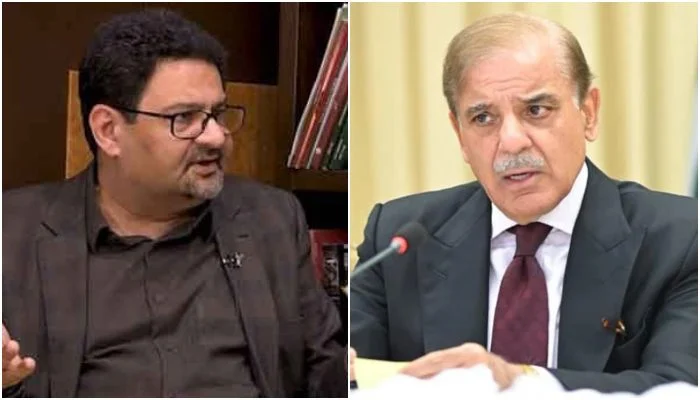Former Finance Minister Miftah Ismail has strongly criticized the Shehbaz Sharif-led government for introducing a “mini-budget disguised as development projects for Balochistan,” by denying the general public relief in petroleum prices.
Speaking on Geo News’ program “Geo Pakistan,” Miftah — a former PML-N leader — launched a scathing attack on the Shehbaz government for maintaining fuel prices and not passing on the benefits of lower international fuel prices to Pakistani citizens.
“You don’t need anything else […] you can utilize the provincial government’s funds as its budget is in surplus. This is a mini-budget that you’re trying to justify in the name of development for Balochistan,” said Miftah, the Secretary-General of Awaam Pakistan.
Prime Minister Shehbaz has announced that the savings from withholding fuel price relief will be used for the development of the N-25 Highway in Balochistan, which connects Chaman, Quetta, Kalat, Khuzdar, and Karachi.
By keeping petroleum prices unchanged, the government has increased the petroleum levy by Rs8.72 per liter on petrol (from Rs70 to Rs78.72 per liter) and by Rs7.01 per liter on diesel (from Rs70 to Rs77.01 per liter).
Petroleum Minister Ali Pervaiz Malik, defending the decision in a televised address, stated that fuel prices remained lower than those in neighboring countries and that the freeze supported development priorities in Balochistan.
He urged the public to accept what he termed a “small inconvenience” for the sake of long-term national development.
This argument was echoed by PM Shehbaz, who, while speaking at an event in Islamabad, said that the savings from maintaining petroleum prices would be spent on the development of Balochistan.
He added that a project has been planned for the construction of the Karachi-Quetta highway, under which a high-quality road will be built at a cost of Rs300 billion within two years, and that the dangerous road, which has claimed around 2,000 lives, would be transformed into a highway.
Calling it a gift for the people of Balochistan, the prime minister remarked that those who oppose such projects are narrow-minded.
Highlighting the doubling of Balochistan’s quota in the National Finance Commission (NFC) Award, the premier said that the highway project would be built while adhering to the highest standards.
However, pointing out the flaws in the government’s approach, Miftah — who has also served as finance minister under PM Shehbaz — said that separate funds are allocated for development projects.
The Awaam Pakistan leader noted that the government has allocated Rs1,100 billion for such initiatives — of which around Rs700 billion have been allocated for lawmakers across Pakistan — and said that the government could have utilized funds from the provincial government’s budget, which is also in surplus.
He argued that it shouldn’t be the case that funds from the federal budget are used for motorways in Punjab, but when it comes to such projects in other provinces, taxes from all Pakistanis are used.
“There’s always a way when there’s competence and the right [thought] approach,” he said in response to a question about whether the government is acting out of necessity due to a lack of alternatives.
He claimed that the government was aware of the possibility of a fall in petroleum prices globally and had therefore promised the International Monetary Fund (IMF) to utilize that, along with the imposition of new taxes, to avoid introducing a mini-budget.
Highlighting that the government imposed Rs17 in taxes in March, coupled with up to Rs30 in the ongoing month, and that the same amount would be collected from the public in May and June, Miftah said that the government is poised to collect around Rs100 billion from the public, which amounts to roughly 8% of the total budget and is therefore practically a “mini-budget.”
Acknowledging that every government needs funds, Miftah called for the government to reduce its own expenses. He lamented that while the salaries of ministers and lawmakers were being increased by up to 300%, the salaried class faces a 40% tax, which rises to 50% for businesses.
Lamenting the exorbitant electricity and gas prices, which he termed the highest in the region, he remarked that the government could have used the funds left over from the Public Sector Development Program (PSDP) funds, which had been increased by 64%.
When asked about giving credit to the government for saving the country from default, the former finance minister said that the government should be given credit where it’s due.
He noted the favorable global environment regarding commodity prices, from which Pakistan has benefited, and said that if the government wants to take credit for the fall in oil prices, then they should.
Saying that the government can engage in all sorts of “show projects” such as air ambulances, the reality, according to Miftah, is that the average Pakistani’s salary has practically decreased in the past three years, and over 100 million people are living below the poverty line, alongside a staggering 26.2 million out-of-school children in the country.
Lamenting what he called a dysfunctional system that cannot provide basic amenities such as health, education, and drinking water to the masses, Miftah criticized the government for transferring the burden of increased prices to the people but denying them relief when prices fall.



